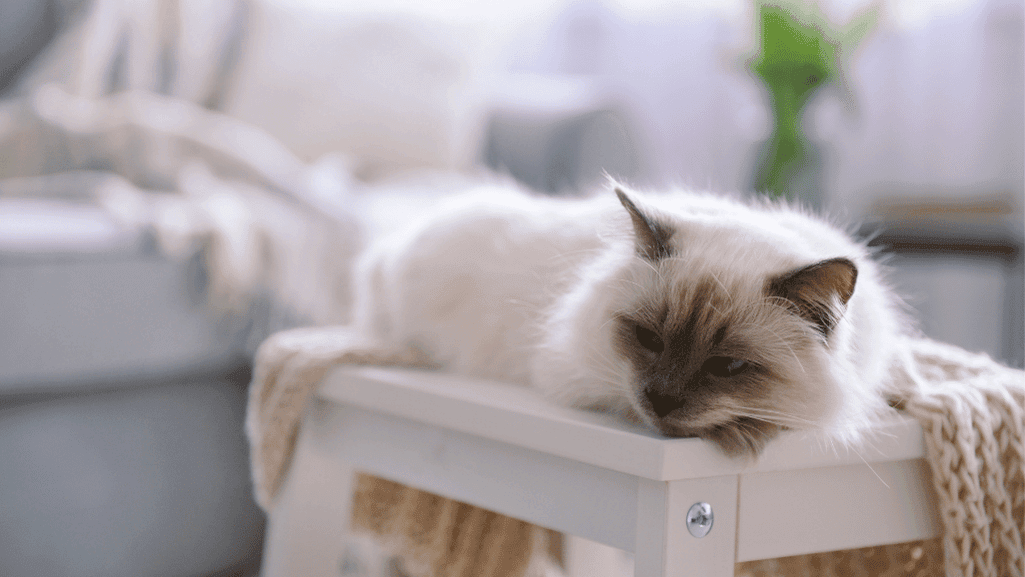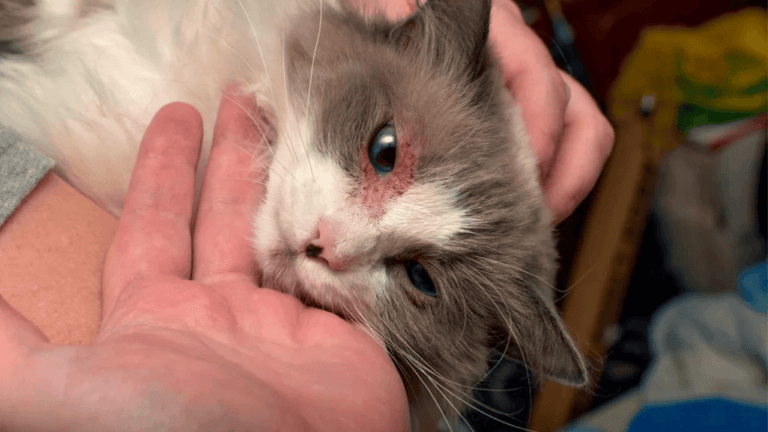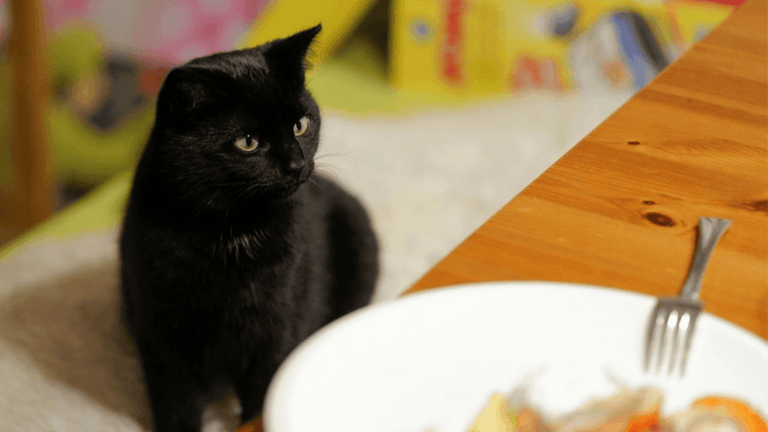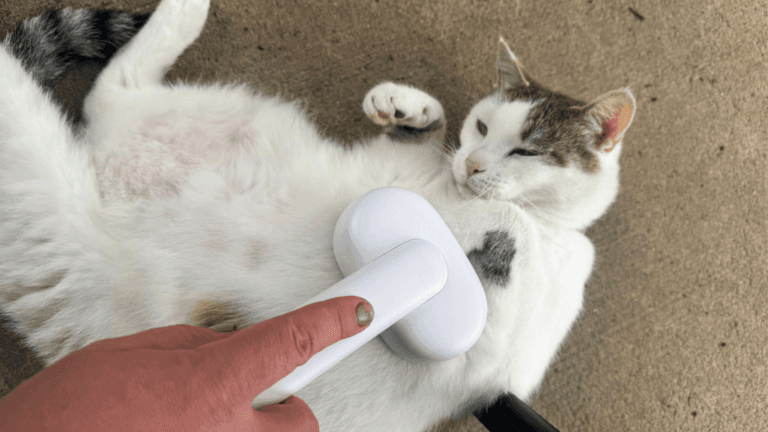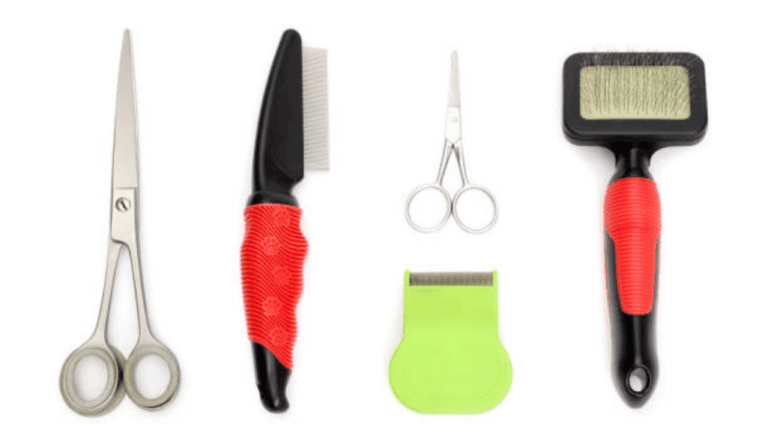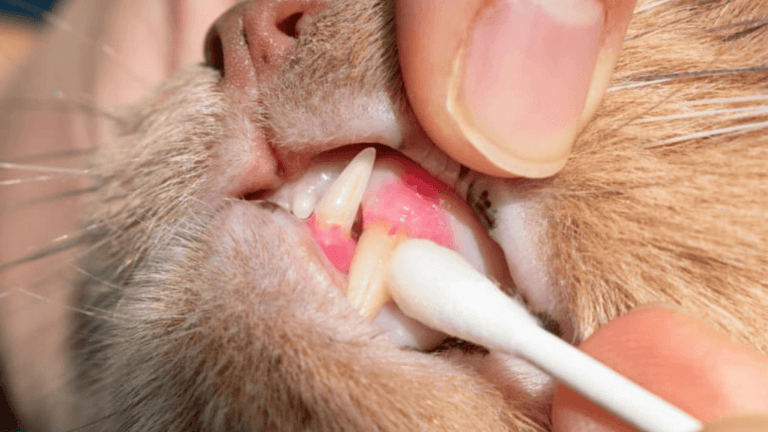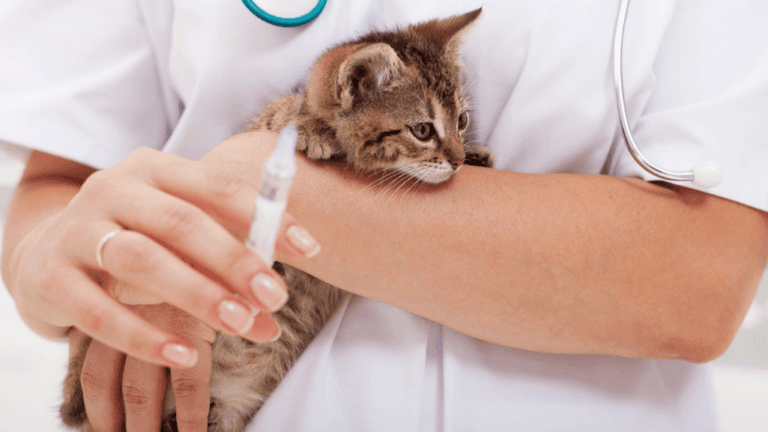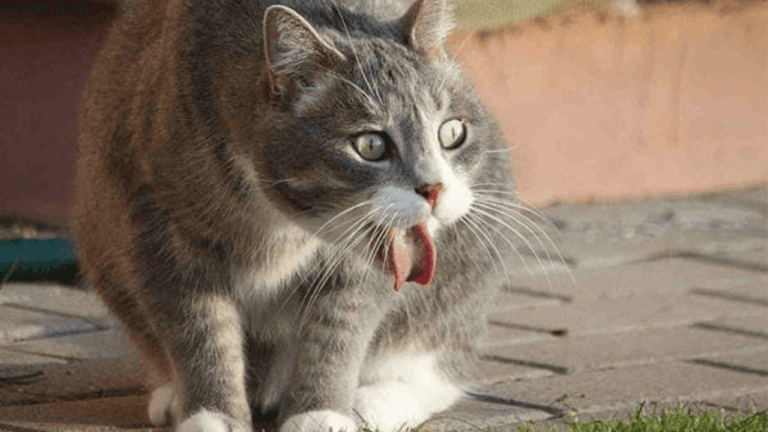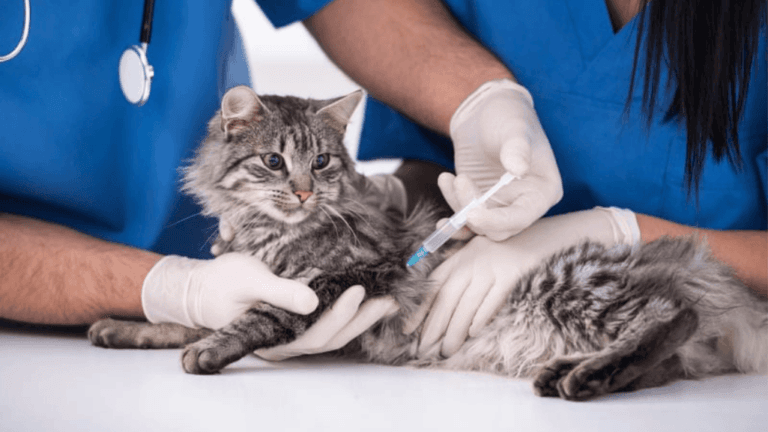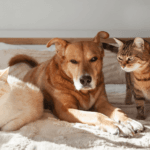Cat diarrhea is a common problem that worries both cats and their owners. It’s marked by loose, watery stools and frequent bowel movements. While occasional diarrhea might not be serious, persistent or severe cases can lead to dehydration and health issues, mainly in young kittens, senior cats, or those with health problems.
There are many reasons for cat diarrhea, like changes in diet, parasites, infections, and serious health issues. Finding out why your cat has diarrhea is key to treating and preventing it. Simple home remedies and diet changes can help in some cases. But, if your cat’s diarrhea lasts long, has blood, or shows signs of dehydration or pain, you need to see a vet quickly.
This guide will help you understand cat diarrhea, its symptoms, and treatments. It also offers tips to prevent it. By knowing about your cat’s digestive health, you can keep them comfortable and healthy. Always talk to your vet if you’re worried about your cat’s health for personalized advice and care.
Remember, while some cat breeds may be more prone to health issues, diarrhea can happen to any cat. By knowing the causes and keeping your cat’s digestive health in check, you can lower the risk of diarrhea and other stomach problems.
Key Takeaways
- Diarrhea in cats can have various causes, including dietary issues, parasites, infections, and underlying health conditions.
- Young kittens, senior cats, and those with chronic diseases are at higher risk for complications from untreated diarrhea.
- Treatment options may include dietary modifications, probiotics, fiber supplements, and medications in severe cases.
- Seek veterinary care if your cat experiences prolonged diarrhea, blood in the stool, dehydration, or appears in pain.
- Preventing cat diarrhea involves maintaining a healthy diet, regular parasite prevention, and reducing stress in your cat’s environment.
Understanding Cat Diarrhea
As a cat owner, knowing about your pet’s health is key. Diarrhea in cats is common and can show a bigger problem. While occasional diarrhea is okay, chronic cases can cause dehydration and health issues.
What is Cat Diarrhea?
Cat diarrhea means loose, watery stools that happen more often. It’s caused by fast movement of feces through the intestine. This leads to less water, nutrients, and electrolytes being absorbed.
Experts say diarrhea is chronic if it lasts more than two days. Seeing a vet is important to find the cause and treatment. If you have more than one cat, each needs attention.
Common Signs and Symptoms
Watch for these signs of diarrhea in your cat:
- Increased frequency of bowel movements
- Loose or watery stools
- Blood in the stool
- Vomiting in cats
- Cat dehydration
- Fever
- Loss of appetite
- Abdominal pain
If your cat shows these symptoms for more than a day, see a vet. They might ask for a fresh fecal sample to find the cause.
Most diarrhea cases are not serious. But, severe or long-lasting diarrhea can cause dehydration. This might need hospital care and IV fluids. Knowing when to take your cat to the vet is important for their health.
By learning about cat diarrhea causes, symptoms, and treatments, you can help your cat stay healthy.
Causes of Diarrhea in Cats
Feline diarrhea can come from many sources, from simple diet changes to serious health problems. Knowing why your cat has loose stools is key to treating their diarrhea and getting their digestive system back on track.
Dietary Issues
Diet is a big reason for cat diarrhea. Changes in food can upset their sensitive stomachs. Food allergies and intolerances can also cause stomach problems, with 30% of cats with idiopathic diarrhea improving on hypoallergenic diets.
Feeding spoiled or toxic foods can also irritate a cat’s gut. Kittens are more likely to get diarrhea from their diet because their stomachs are not fully developed. It’s important to feed them a balanced diet that’s right for their age to keep their digestive system healthy.
Parasites and Infections
Intestinal parasites like worms and protozoa can harm a cat’s digestive system, causing diarrhea. Common culprits include roundworms, hookworms, and Giardia. These parasites are more common in young cats and those in crowded places like catteries.
Bacterial and viral infections can also cause sudden diarrhea in cats. Pathogens like Campylobacter and feline panleukopenia virus can lead to severe inflammation and loose stools. A fecal PCR panel can help find the cause of your cat’s diarrhea.
Other Health Conditions
Many health issues can cause diarrhea in cats. Inflammatory bowel disease (IBD) is a common cause of chronic diarrhea. Interestingly, 80% of cats with IBD were later found to have lymphoma, showing the need for a thorough vet check.
Other causes include liver and kidney disease, exocrine pancreatic insufficiency (EPI), and some medications. While EPI is rare in cats, it can cause severe digestive problems. Endocrine disorders like hyperthyroidism can also affect a cat’s digestive system, leading to loose stools.
Stress and anxiety can also affect a cat’s digestive health. Hairless cat breeds, like the Sphynx, may be more prone to stress-related diarrhea due to their unique needs and sensitivity to changes.
Treating Cat Diarrhea
When your cat has diarrhea, finding the right treatment is key. The treatment depends on the cause, which can be diet, infections, or chronic health issues.
Dietary Modifications
Simple diet changes can often fix cat diarrhea. If your cat has tried new food or treats, going back to their usual diet might help. For mild cases, fasting for a bit and then eating boiled chicken and rice can help their digestive system recover.
High-fiber diets can also help by making stools bulkier and improving digestion. Cats with food allergies or intolerances might need special diets. These diets should have new protein and carbs and be tried for 8-12 weeks.
Probiotics and Fiber Supplements
Probiotics help keep your cat’s gut healthy. They are great for fixing diarrhea by balancing gut bacteria. Fiber supplements like psyllium husk or pumpkin can also make stools firmer and help with bowel movements.
These supplements are good for chronic diarrhea. Remember, the gut is a big part of your cat’s immune system. Keeping it healthy is important for their overall well-being.
Medications for Severe Cases
For severe diarrhea, medications might be needed. Anti-diarrheal drugs can control symptoms. Dewormers treat parasites, and antibiotics like metronidazole or tylosin are for bacterial infections.
It’s important to follow your vet’s instructions for these medicines. Some can have bad side effects if taken too much. For example, cats should not take more than 50 mg/kg of metronidazole to avoid serious problems.
Even a mild case of diarrhea in cats can become serious if not treated early enough.
Keeping your cat hydrated is very important during treatment. Encourage them to drink water or offer ice chips. In bad cases, your vet might suggest subcutaneous fluids to prevent dehydration.
With quick action and the right treatment, most cat diarrhea can be managed. This helps your cat feel better and get back to being playful.
When to Seek Veterinary Care
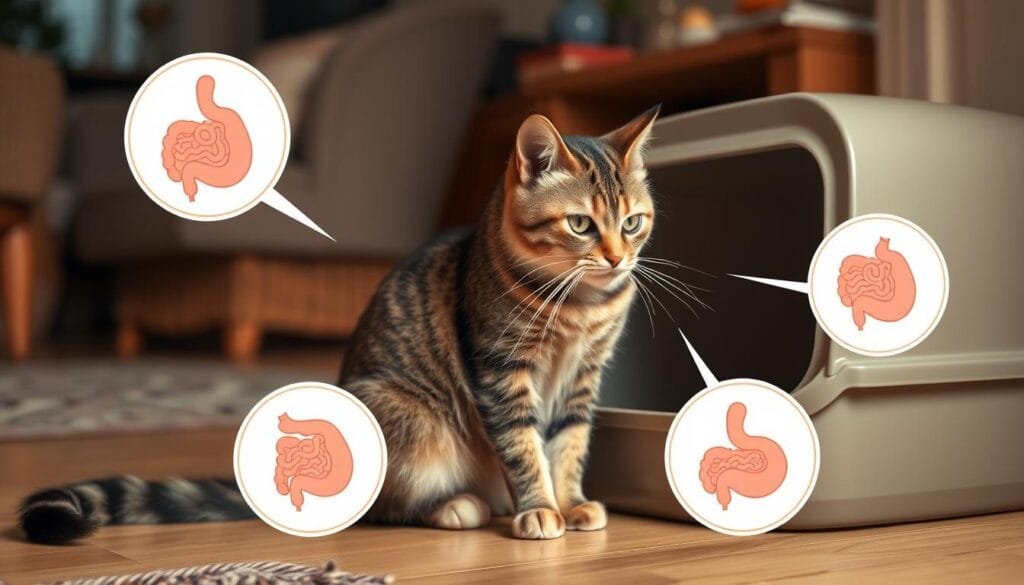
While mild cases of cat diarrhea may get better on their own, it’s key to know when to get help. If your cat’s diarrhea lasts more than 24 hours or comes with other bad signs, it’s time to see a vet.
Watch for bloody stools, vomiting, being very tired, or eating much less. These could mean a serious problem like an infection or chronic illness. Kittens, older cats, and those with health issues are more at risk and can get dehydrated fast.
When you go to the vet, tell them everything about your cat’s bowel movement issues. Share how long and how often they happen, and any diet or environment changes. Your vet might ask for a stool sample to find out what’s wrong and how to treat it.
In bad cases, your cat might need to stay in the hospital for fluids, meds, or other care. Trust your vet to make a plan that fits your cat’s needs. With quick action and the right care, most cats can get better and live happily again.
“When in doubt, always err on the side of caution and consult with your veterinarian about your cat’s digestive health.”
As a pet owner, it’s your job to watch closely and act fast if you think your cat is sick. Knowing the causes of diarrhea in cats and when to get help is key. This way, you can help keep your cat healthy and avoid big problems.
Preventing Cat Diarrhea

Keeping your cat’s digestive system healthy is key to their well-being. By supporting their digestive system, you can lower the risk of chronic diarrhea. This helps keep your cat’s gut in top shape.
Maintaining a Healthy Diet
Feeding your cat a balanced diet is a great way to prevent diarrhea. Avoid sudden food changes, as they can upset your cat’s stomach. Introduce new foods slowly to help their body adjust.
For kittens, be careful with cow’s milk. It can cause diarrhea because kittens can’t digest lactose well.
Regular Parasite Prevention
Intestinal parasites like roundworms and hookworms can cause diarrhea in cats. Regular deworming and parasite prevention are vital. Your vet will tell you when to do this.
Young cats are more at risk of getting sick. Keeping them up-to-date on vaccinations is important to prevent diarrhea.
Reducing Stress in Your Cat’s Environment
Stress can make your cat’s stomach upset. Make sure they have a clean litter box and plenty of food, water, and toys. A calm routine is also key.
Spotted cat breeds like Bengals and Ocicats need extra play to stay happy and healthy.
Regular vet visits can catch health problems early. This helps avoid chronic diarrhea and keeps your cat’s digestive system working well. It’s all about prevention and early action for your cat’s health and happiness.
Conclusion
In conclusion, feline diarrhea is a common issue in cats. It can be caused by many things, like changes in diet, food allergies, infections, and health problems. It’s important to know the signs of diarrhea in cats, like frequent bowel movements and watery stool.
Signs also include feeling tired. Recognizing these signs early can help prevent dehydration and other serious problems.
Treatment for cat diarrhea can include changing their diet. This means slowly introducing a new, bland food. Sometimes, medications like antibiotics are needed. Keeping the cat hydrated and giving them rest is also key.
Regular vet visits are important. They help keep an eye on the cat’s health and treat any ongoing diarrhea issues.
To stop diarrhea from happening again, owners should feed their cats a balanced diet. They should also stick to a regular deworming schedule. Avoiding sudden changes in food can also help.
Slowly introducing new foods over a week or 10 days can prevent upset stomachs. By understanding and managing cat diarrhea, owners can keep their pets healthy and happy.



